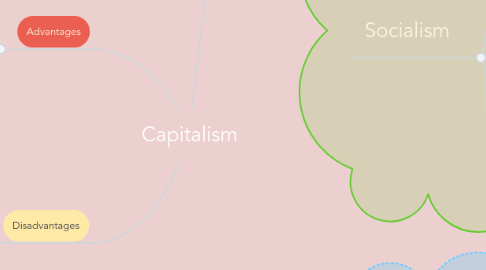
1. Advantages
1.1. Incentives to become wealthy.
1.1.1. Consumers can choose they products they desire. We are afforded variety in the products that we choose we are not tired to just one specific brand milk we have numerous choices.
1.1.1.1. Better than the other types of economic systems. While not perfect this is clearly the best choice.
1.2. Encourages efficient operation of business. This is done to help maximize profit. A more efficient operation saves money and valuable resources.
1.2.1. Encourages innovation. Companies have the freedom to come up and institute new products and technologies. This encourages economic growth.
1.2.1.1. Helps to prevent large bureaucratic government.
2. Capitalism is defined as an economic and political system in which a country's trade and industry are controlled by private owners for profit, rather than by the state
2.1. A good example of this would be the fact that I would like to open my own gaming business here in my community. The government has no input on what I make how much I make when I make it. I set all those parameters. No I do have to abide by federal and local laws, but I can do business when and with whom I want to. If I want to make 1000 widgets I can.
2.1.1. In the United States this is the type of economy that we currently have in place.
2.1.1.1. It is important to have a viable and working economic system. It helps to encourage and and innovative idea and products. This stimulates the economy causing a continued growth. A working economic system allows and rewards people who work hard and creative it inspires many great innovations. It helps to establish an order in society and motivates people to achieve.
3. Disadvantages
3.1. Possibility of Companies becoming a Monopoly. One company having complete control of lets say the only phone provider is not a good thing they can control and price how they see fit. Firms can exploit and charge higher prices.
3.1.1. Can lead to inequality. This can create social division.
3.2. Lower Wages business with Monopoly control can pay lower wages since they have no other companies to compete against.
3.2.1. Prone to Boom and Bust Cycles. We may be doing really great this month but next month the bottom can fall out causing business to fail.
4. Socialism
4.1. Socialism is defined as an economic theory of social origination which advocates that the means of production, distribution, and exchange of goods should be regulated by the community as a whole to include Government playing a controlling part.
4.1.1. A prime example of this type of Economy can be seen in China. The state there very much exhibits almost absolute control over every aspect of their citizens lives
4.2. Advantages
4.2.1. A more equal society
4.2.1.1. Eliminates monopolies. This ensure no one cooperation has complete control and ensure that fair wages will be paid to employees.
4.2.1.1.1. Public ownership means can companies can be run to benefit the public interest, rather than than to just make the shareholders more profit.
4.3. Disadvantages
4.3.1. It runs on bureaucracy. This can hamper the delivery of services to the people. As a result they do not have immediate access to goods and services should they require them right away.
4.3.1.1. The government has too much control. With the government control certain industries and good it can dedicate how much people are paid for their goods and services.
4.3.1.1.1. People are unmotivated to develop entrepreneurial skills, since the government controls much of the industry they know they will not get compensated for their ideas. They also know the government will have input and they will have to pay higher taxes.
5. Communism
5.1. Communism is defined as an economic doctrine that aims to replace private property and a profit-based economy with public ownership and communal control of at least the major means of production (e.g., mines, mills, and factories) and the natural resources of a society
5.1.1. A great current example of a country where this is being applied is North Korea. The government here has complete control of all economic, production , prices of its citizens.
5.2. Advantages
5.2.1. This structure makes it easier for the leadership to transform the economic vision of the country to what the person in charge wants.
5.2.1.1. Creates equality on a level that capitalism can never truly offer.
5.2.1.1.1. Allows for everyone to have equal employment opportunists. Each employee has an equal part in the production process.
5.3. Disadvantages
5.3.1. The single biggest draw back to this is the government owns everything. It completely eliminates free market from the society.
5.3.1.1. Efficiency and productivity are limited since there is no motivation for the workers. This is no entrepreneurship help to support and drive the economy.
5.3.1.1.1. The government does not consider the needs of the consumer.
